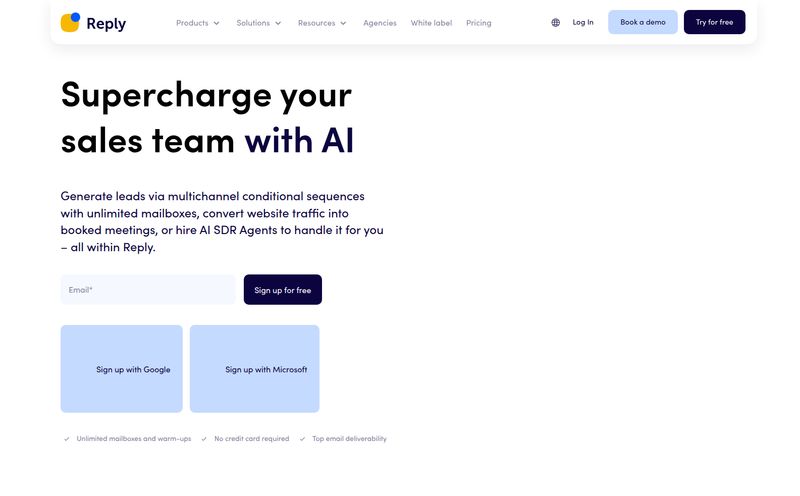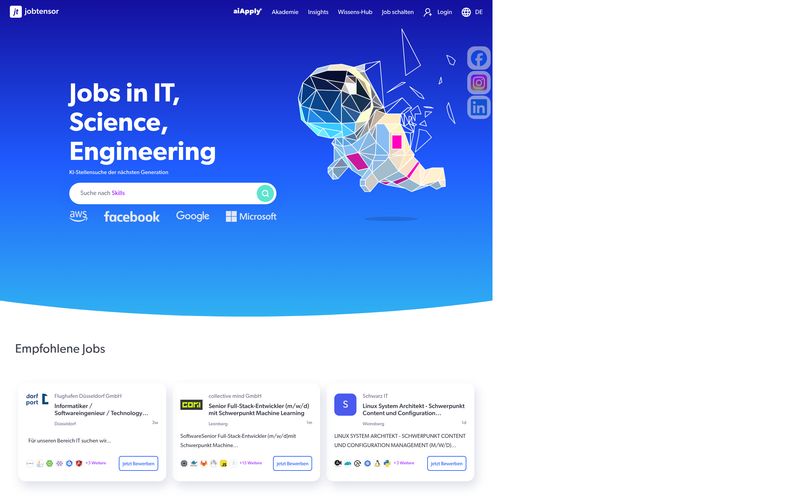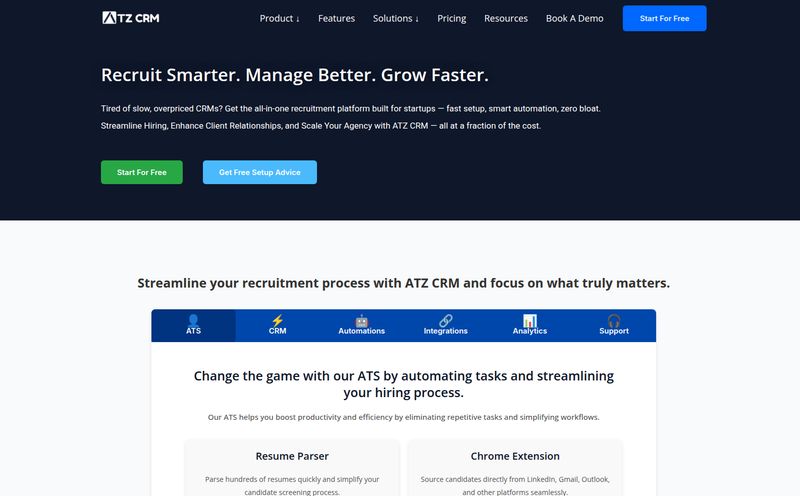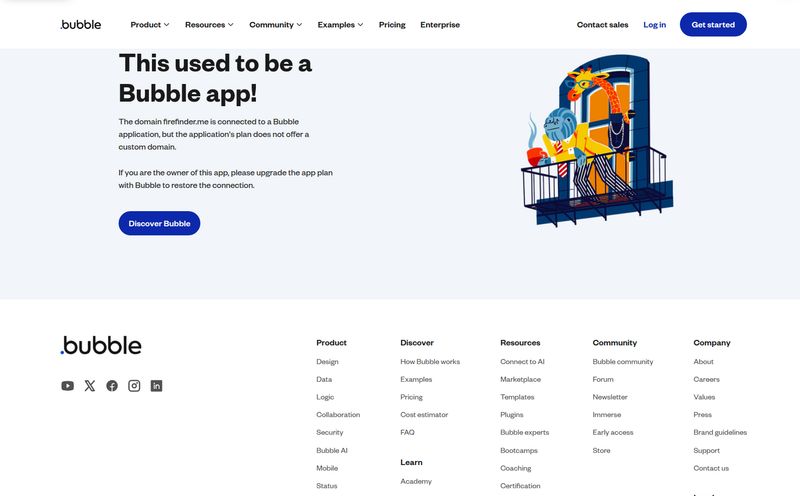How much of your workday is spent not actually doing work, but managing the work about the work? You know what I mean. The constant Slack pings to see if a task is done. The endless email chains trying to coordinate a handoff. The daily stand-ups that feel more like status report nightmares. We've got Asana, Jira, Trello... a whole suite of tools that are fantastic at tracking what needs to be done. But they don't actually do it.
It's what the folks at BusinessFlow call the “Coordination Gap,” and honestly, it’s a productivity black hole. I’ve seen it cripple teams, slowing down projects and burning out good people. So when I came across a platform that claims to be an “intelligent operations co-pilot,” my curiosity was definitely piqued. A tool that doesn’t just track the workflow but actively orchestrates it? Okay, you have my attention.
So, I took a look under the hood of BusinessFlow AI. Is it just another piece of software with fancy AI branding, or is it genuinely a new way of working? Let's get into it.
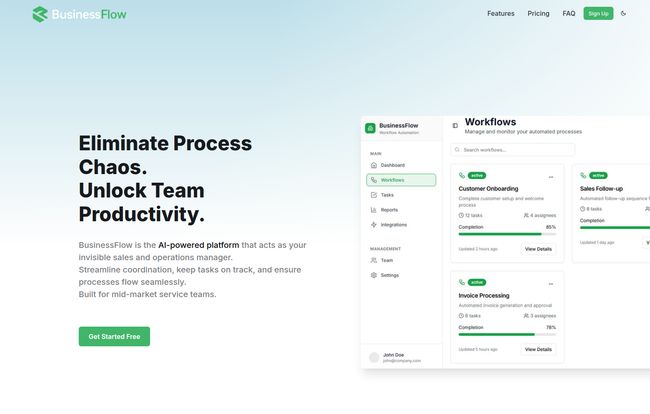
Visit Businessflow AI
What Exactly is BusinessFlow AI? (Hint: It’s Not Just Another Project Manager)
Here’s the fundamental difference. Your typical project management tool is like a map. It shows you the destination and the route, but you still have to drive the car. BusinessFlow AI, on the other hand, is more like the car's autopilot. It doesn't just show you the path; it actively steers, manages the speed, and handles the lane changes to get you there.
It’s built around the idea of an “AI-native work orchestration platform.” Fancy words, I know. In simple terms, it uses AI agents to act as the connective tissue for your business processes. These agents aren't just glorified automations; they are designed to manage handoffs between people and tools, execute repetitive tasks, and provide real-time visibility into what’s actually happening. It’s less about a to-do list and more about creating a self-running operational engine.
A Real-World Example: Fixing the Hiring Headache with AI
To make this less abstract, let’s apply it to one of the most notoriously chaotic processes in any company: recruitment. Everyone who's ever had to hire someone knows the pain. The mountain of resumes, the scheduling Tetris, the endless back-and-forth. It’s a prime candidate for some serious orchestration.
From Resume Piles to Candidate Pipelines
Imagine you post a job opening. Instead of you or your HR manager manually sifting through hundreds of resumes, a BusinessFlow AI agent takes the first pass. It analyzes each resume, comparing it against the specific requirements of the job description you provided. It doesn't just look for keywords; it understands context. The result? A ranked and reasoned shortlist of the most promising applicants. The hours, even days, saved here is just staggering. You go from a pile of digital paper to a prioritized list of people you actually want to talk to.
The AI-Powered Interviewer
But it can go a step further. The platform talks about AI-powered applicant interviews. Now, this isn't about replacing the human connection of a final interview. Not at all. Think of it as a hyper-efficient screening round. The AI can conduct initial assessments or ask standardized screening questions, freeing up your team to focus their energy on the qualified candidates who have the best shot. It ensures every applicant gets a fair, consistent first look, and it provides a transparent, explainable reason for its rankings. No more “gut feeling” rejections that might hide unconscious bias.
The Core Features That Make It Tick
While fixing recruitment is a fantastic use case, BusinessFlow is designed for any complex process. Here’s what powers it:
- AI Orchestration & Coordination: This is the brain. It’s the system that understands your workflow—who needs to do what, which tool is required, and what happens next. It’s the air traffic controller for your projects.
- Active Human Coordination: The platform doesn't just automate things into a void. It actively pings team members when their input is needed, collects information, and ensures the human parts of the process don’t get dropped.
- Drives Real Execution: This is the part that blows my mind a little. It doesn't just assign a task to “generate a report.” In many cases, it can integrate with your tools and actually generate the report itself.
- Configurable Workflows: This isn't a rigid, one-size-fits-all system. You define the processes. Whether it's client onboarding, content production, or bug-fixing, you map it out, and the AI co-pilot takes the wheel.
The Good and The Not-So-Good
No tool is perfect, right? From my analysis and experience with similar platforms, here's how I see the trade-offs.
| What I Like | Potential Downsides |
|---|---|
| Drastic reduction in the manual, tedious coordination that kills productivity. The 85% boost claim is bold, but I can see how it's possible. | Over-reliance on AI could miss important human nuance, whether in a candidate's personality or a creative project's needs. |
| Creates a genuine "single source of truth" because the system is tracking and doing the work in real-time. | There's always a risk of algorithmic bias if the system isn't monitored and configured carefully. |
| Improves the quality of outcomes by systematizing processes and reducing human error. | There's an initial time investment to define and configure your workflows. It's not a plug-and-play magic wand. |
Breaking Down BusinessFlow's Pricing
The pricing structure seems pretty straightforward and aimed at growing companies. They don't have a free-forever plan, which tells me they're focused on teams who are serious about solving this coordination problem.
The Mid-market plan runs from $20 to $28 per seat, per month. This gets you the core AI work orchestration, standard integrations, and team collaboration features. A great starting point. They also offer a 14-day free trial on this tier, which is awesome.
The Mid-market + plan is $39 to $49 per seat, per month. This seems to be where the real magic happens. It adds dedicated AI Orchestrators and Agents, a hefty number of AI usage credentials and access to advanced integrations. This is for teams ready to go all-in on AI execution.
Finally, there's a custom Enterprise plan for large-scale needs, with options for on-premise deployment and dedicated support.
Is BusinessFlow AI Right for Your Business?
So, who is this for? In my opinion, if you're a small team of three people sitting in the same room, this is probably overkill. Stick to your whiteboard or a simple Trello board.
But if you're a scale-up or an established company with complex, multi-step processes that involve handoffs between different people and different software... this could be a game-changer. Think about marketing campaign execution, enterprise sales cycles, software development pipelines, or as we discussed, large-scale recruitment. Any area where the process itself is the bottleneck is where a tool like BusinessFlow AI could provide a massive return on investment. It's for leaders who are tired of hearing “what’s the status of X?” and want to build a more resilient, efficient operation.
Frequently Asked Questions about BusinessFlow AI
- How is BusinessFlow different from tools like Asana or Jira?
- The biggest difference is that Asana and Jira are for tracking work; they are passive systems that require humans to update them. BusinessFlow is designed to actively execute and coordinate the work using AI agents, making it an active participant in the process.
- Do I need to be a developer or super technical to use it?
- According to their site, no. It’s designed with a user-friendly interface and a no-code workflow builder. The goal is for business users, not just engineers, to be able to map out and automate their processes.
- What does the implementation look like?
- It starts with defining your existing workflows and identifying the pain points. You then use the platform's builder to map out those steps, connect your existing tools (like your email, CRM, or HR software), and assign tasks to either humans or AI agents. It's an initial setup, but one that pays off in the long run.
- Can the AI be customized for our industry's specific needs?
- Yes, that’s the point of the configurable workflow builder. The system isn't pre-programmed for just one industry. You teach it your process, whether you're in real estate, healthcare, or SaaS. The AI agents learn to execute the specific steps and handoffs that are unique to your operations.
- Is there a risk of the AI making a mistake?
- Of course, as with any system. That's why the 'Active Human Coordination' part is so important. The platform is designed to work with humans, not replace them entirely. It handles the 80% of repetitive, predictable work to free up people to supervise, handle exceptions, and focus on the 20% that requires strategic thought and creativity.
Final Thoughts on the AI Co-Pilot
I started this a bit skeptical, as I always am with big, bold claims. But the more I think about BusinessFlow AI, the more it makes sense. We've hit a ceiling with what simple task management software can do for us. The next frontier isn't better tracking; it's smarter execution. The idea of an AI co-pilot that acts as the orchestra conductor for a business is powerful.
It’s a shift from just managing chaos to truly eliminating it. And for any team lead or operations manager out there, that sounds less like a software feature and more like a dream come true.
Reference and Sources
- BusinessFlow AI Official Website - All product information, features, and pricing were sourced directly from the official platform website.
